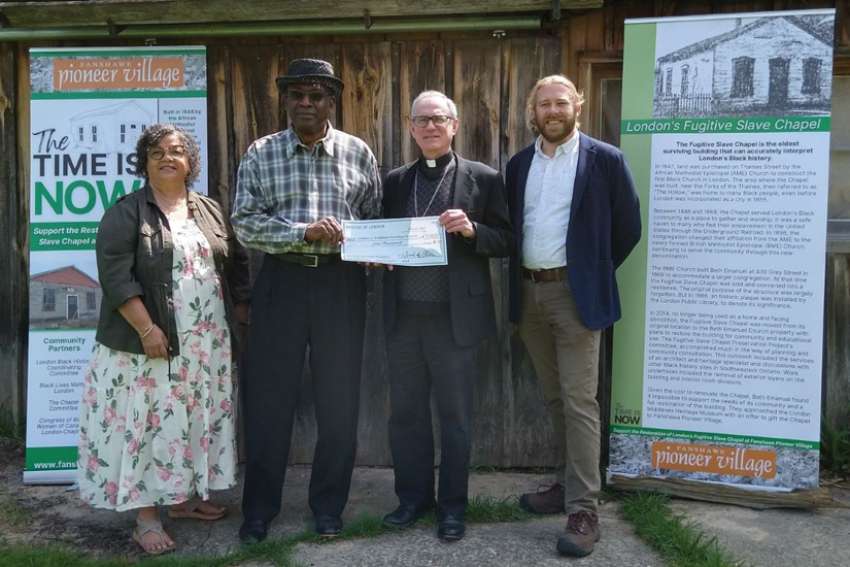London Bishop Ronald Fabbro recently presented a $5,000 cheque to go towards the $300,000 the steering committee behind the campaign needs to achieve its goal. Committee members Christina Lord and Carl Cadogan and FPV board chair Tom Peace received the donation.
“The project to preserve the chapel will enable future generations to learn about this important part of Canadian history, the history of slavery in North America and the role that chapels like this one played in helping fugitive slaves settle after finding freedom in the north,” said Fabbro in a statement. “The whole history of the Underground Railroad needs to be known and promoted. We appreciate that our support will help preserve a house of worship that is a notable reminder of the importance of faith in the life of the people of that era as well as today.”
Between 1848 and 1869, the chapel served London’s Black community as a place of worship and was a safe haven to many who fled their enslavement in the United States through the Underground Railroad. As it stands in its current location on Grey Street, the building is at risk of further deterioration. Once transported to FPV it will be fully restored and repurposed to teach about slavery, the Underground Railroad and the area’s Black histories.
The diocese is grateful for the opportunity to support the project to help preserve the history of the Black communities that have existed in southwestern Ontario for over two centuries and is encouraging the Catholic community in London to volunteer and contribute through individual donations.
The campaign is roughly two-thirds of the way to reaching its goal and it is hoped the chapel will be transported before the coming winter.
Local community groups such as the London Black History Coordinating Committee, the Chapel Committee, Congress of Black Women of Canada and Black Lives Matter London - Fanshawe Pioneer Village have also been working to support the initiative.
“It is important for members of the Black community, in London, to see historical buildings that tell ‘Our Story,’ ” said Nikisha Evans, president of the Congress of Black Women of Canada, London chapter in a statement. “lt is even more important for the community at large to become more informed of the role London played in the freedom of Black slaves.”
In 1847, land was purchased on Thames Street by the African Methodist Episcopal Church to construct the first Black church in the community. The area where the chapel was built, near the Forks of the Thames, then referred to as “The Hollow,” was home to many Black people, even before London was incorporated as a city in 1855.
The church was renamed the British Methodist Episcopal Church in 1856 and a new building was erected at 430 Grey St. in 1869 to accommodate a larger congregation. At that time the Fugitive Slave Chapel was sold and converted into a residence and the original purpose of the structure was largely forgotten. In 1986, a historic plaque was installed by the London Public Library to denote its significance.
Local community organizations have several stories about the Fugitive Slave Chapel and the experience of escaped enslaved people living in Canada. Looking at these stories from the past help the London community to reflect on the contemporary experiences of racism which remains a reality for Black Canadians. Fabbro says the testimonies of escaped slaves speaks to the strength they drew from their Christian faith, both during their enslavement and on the long journey north.


